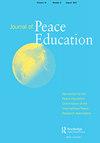The role of civil society organizations in deconstructing ethnopolitical conflict narratives through peace education: lessons from the Northern Region of Ghana
IF 1.3
Q3 EDUCATION & EDUCATIONAL RESEARCH
引用次数: 0
Abstract
ABSTRACTThe collective adherence to contradictory conflict narratives has underpinned the intractable ethnopolitical conflicts that have occurred in the Northern Region of Ghana. Changing the conflict narratives that perpetuate ethnopolitical conflicts in the region through peace education is a prerequisite for any meaningful peacebuilding. Consequently, the study examined how civil society actors use peace education to deconstruct negative conflict narratives in the region. The study is qualitative and relied on both primary and secondary data sources. Primary data was obtained through in-depth interviews with 20 participants. The data was analyzed using an inductive-deductive thematic analysis approach with the aid of NVivo 12 software. The study found that civil society organizations’ (CSOs) peace education programs create awareness, facilitate mutual understanding, and engender values of human rights, non-violence moves to conflict resolution, reconciliation, and trust-building. Peace educational activities by CSOs, whether direct or indirect, and whether in educational settings or the community, are essential in changing the socio-psychological infrastructure that perpetuates a culture of violence. It is proposed for broader engagement with CSOs for the initiation and implementation of context-specific peace education programs to help deconstruct the conflict narratives that perpetuate identity conflicts in some parts of Ghana.KEYWORDS: Northern Ghanapeace educationpeaceethnopoliticalcivil societyconflict narrative Disclosure statementNo potential conflict of interest was reported by the author(s).Additional informationNotes on contributorsMathias Awonnatey AtengMathias Awonnatey Ateng holds a Ph.D. in Peace and Conflict Studies from the University of Manitoba. He is currently a Researcher with the Centre for Peace and Security Studies, University for Development Studies. His research interest include civil society and peacebuilding, peace education, peace policy and infrastructure, peace processes in communal conflicts and peace leadership. He has over ten years of working experience in research and practice.Mohammed Gadafi IbrahimIbrahim MOhammed Gadafi holds a Doctor of Philosophy in Development Studies with specialization in peacebuilding and conflict Management. He is currently a lecturer at the Department of Political Science at the University for Development Studies, Ghana. His research interest covers conflict management, peacebuilding, security, cultural and rural development, and social policy. As a practitioner and researcher, he has worked with government agencies and civil society organizations to bring sustainable peace and development to commuities in Ghana.民间社会组织在通过和平教育解构民族政治冲突叙事中的作用:来自加纳北部地区的经验教训
摘要对矛盾冲突叙事的集体坚持是加纳北部地区发生的棘手的种族政治冲突的基础。通过和平教育改变使该地区种族政治冲突长期存在的冲突叙述,是任何有意义的建设和平的先决条件。因此,该研究考察了民间社会行动者如何利用和平教育来解构该地区的负面冲突叙述。该研究是定性的,并依赖于主要和次要的数据来源。主要数据是通过对20名参与者的深度访谈获得的。在NVivo 12软件的辅助下,采用归纳演绎主题分析法对数据进行分析。该研究发现,民间社会组织的和平教育项目能够提高人们的意识,促进相互理解,培养人权、非暴力行动、解决冲突、和解和建立信任的价值观。民间社会组织的和平教育活动,无论是直接的还是间接的,无论是在教育环境中还是在社区中,对于改变使暴力文化永久化的社会心理基础设施都是必不可少的。建议与民间社会组织进行更广泛的接触,以发起和实施针对具体情况的和平教育计划,以帮助解构在加纳某些地区延续身份冲突的冲突叙述。关键词:加纳北部和平教育和平民族政治公民社会冲突叙事披露声明作者未报告潜在的利益冲突。作者简介:matthias Awonnatey Ateng拥有曼尼托巴大学和平与冲突研究博士学位。他目前是发展研究大学和平与安全研究中心的研究员。他的研究兴趣包括公民社会和和平建设、和平教育、和平政策和基础设施、社区冲突中的和平进程和和平领导。他有十多年的研究和实践工作经验。易卜拉欣·穆罕默德·卡扎菲拥有发展研究哲学博士学位,专攻建设和平和冲突管理。他目前是加纳发展研究大学政治科学系的讲师。他的研究兴趣包括冲突管理、建设和平、安全、文化和农村发展以及社会政策。作为一名实践者和研究人员,他与政府机构和民间社会组织合作,为加纳社区带来可持续的和平与发展。
本文章由计算机程序翻译,如有差异,请以英文原文为准。
求助全文
约1分钟内获得全文
求助全文

 求助内容:
求助内容: 应助结果提醒方式:
应助结果提醒方式:


